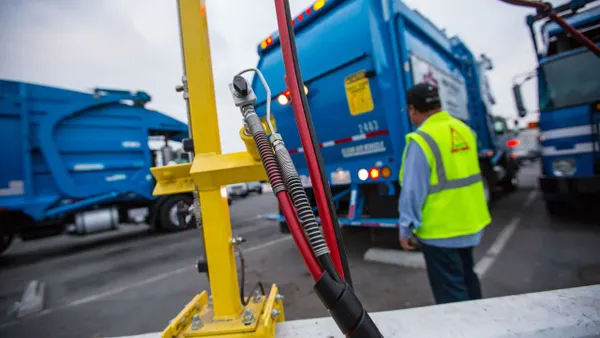UPDATE April 11, 2018: Monday's White House meeting concerning the future of the Renewable Fuel Standard (RFS) ended with little action, as reported by Politico and others.
President Donald Trump has reportedly decided to wait another 3 months for discussions to continue. Reuters' Jarrett Renshaw said Texas Senator John Cornyn is waiting for the Trump administration before unveiling the details of his RFS reform bill. One of Cornyn's aides told Waste Dive the bill was still being drafted, and that they expect the bill to be introduced after it's complete.
Maureen Walsh, director of federal policy for the American Biogas Council, said the organization is "disheartened to hear about additional attempts by the Trump Administration to amend" the RFS.
"We strongly believe that artificially capping RIN prices, allowing waivers more broadly or other efforts to change the RFS program would cause significant harm to biogas producers, farmers, and the U.S. biofuels economy," Walsh wrote.
Dive Brief:
- President Donald Trump is "seriously considering" dropping his personal efforts at reforming the Renewable Fuel Standard (RFS), according to Reuters. Advisers have reportedly told Trump to leave the issue to Congress but keep the "threat of administrative action" in his back pocket.
- Trump will review a list of options for changing the RFS with cabinet officials Monday, Reuters also reported. Those options could range from putting a price cap on Renewable Identification Numbers (RINs) to ending seasonal restrictions on sales of gasoline with high ethanol contents. Two sources told Reuters the White House could make an announcement within the next two weeks.
- A letter from the Iowa Renewable Fuels Association, addressed to Iowa Senators Joni Ernst and Chuck Grassley, said any action from the administration that waives or caps RINs would "be viewed as nothing less than a declaration of war on rural America."
Dive Insight:
The conversation about the RFS usually revolves around oil refiners (who have to pay the cost of RINs) and corn producers, who benefit from refining ethanol. However, methane from landfills and biogas from anaerobic digestion are also listed as "approved pathways" for generating RINs, making such projects eligible for benefits under the current RFS.
Environmental Protection Agency Administrator Scott Pruitt has shown support for biogas projects in the past, and required volumes for fuel produced under the RFS set by the EPA for 2018 were higher than the agency initially proposed. Pruitt, who is facing political pressure to resign, has also said that he's concerned with issues of "fraud" related to the RFS and the fluctuating price of RINs.
While some in the Senate, including Ernst and Grassley, continue to support the RFS, others, including Texas Sen. Ted Cruz (who represents a state heavily reliant on refining oil), have called for price caps and other reforms to the RFS. This schism among conservative lawmakers — those who want to boost agriculture and those who want to defend oil refining — is a key factor as to why the administration has been unable to reach a deal so far.
Trump has repeatedly pledged to defend the RFS, both during his campaign and since taking office. While a new policy announcement out of the meeting may not be too likely, the tone of discussion will be important to watch, as it could signal which direction the administration wants Congress to move as it tackles the RFS.









